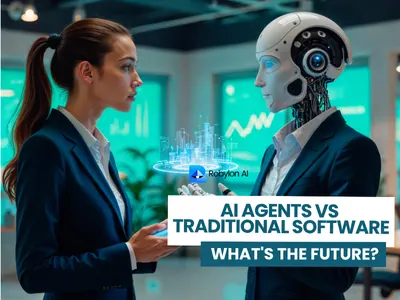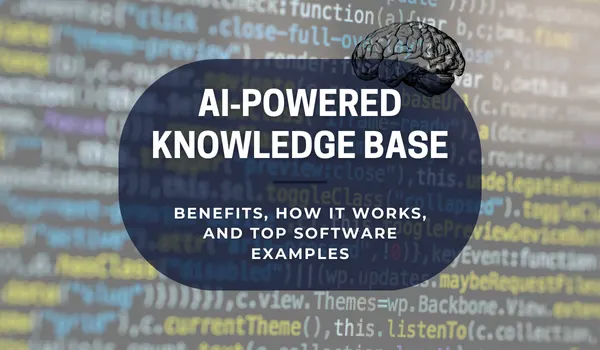TL;DR
In a world where technology is expected to think, act, and deliver AI agents are stepping up to meet that demand. These are not just chatbots that answer with canned responses. They are smart, adaptable systems that can understand your goals, make decisions, and autonomously complete tasks on your behalf. AI agents are proactive and adaptable; capable of learning from context, managing workflows, and solving complex problems.
Today, businesses across industries are turning to AI agents in customer support, marketing, logistics, and internal operations. From conversational AI agents like virtual assistants to fully autonomous AI systems integrated into enterprise workflows, the spectrum of use cases is rapidly growing.
Whether you are a tech leader, CX manager, or startup founder, this guide will help you understand how AI agents are transforming the way we work.
Introduction
In today’s digital-first world, businesses expect technology not just to assist but to think, act, and deliver. Unlike static software or rule-based chatbots, AI agents are intelligent systems that can perceive their environment, make decisions, and take action autonomously. Think of them as digital teammates, capable of handling tasks with minimal human input.
At their core, AI agents are systems powered by artificial intelligence that
- Understand goals and user intent
- Make real-time decisions
- Execute complex tasks
- Continuously learn from interactions
They go beyond simply responding to prompts; they can initiate actions, manage workflows, and adapt as situations change.
In this guide, we will explore AI agents explained from the ground up covering what they are, the different types, how they work, their real-world applications, and why they matter for businesses in 2026 and beyond. Whether you are a product manager, CTO, or curious marketer, this is your go-to resource for understanding the rise of AI-powered automation.
Why Are AI Agents Gaining Traction?
Businesses today are deploying AI agents across Customer support, to resolve queries 24/7. Operations, to automate repetitive processes and Enterprise tools, to drive real-time insights and productivity.
Want to see one working on your stack? Book a 30-minute demo.
What Are AI Agents?
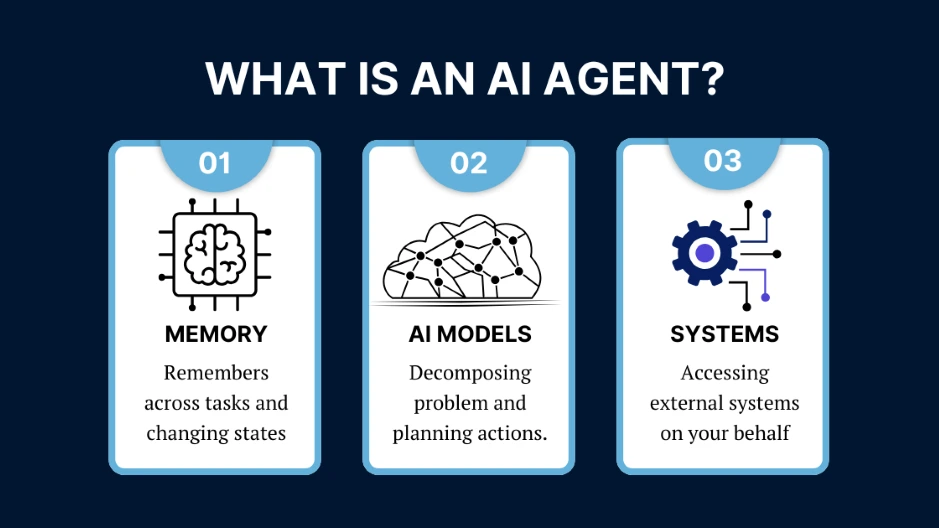
AI agents are autonomous software entities that can observe their environment, make decisions, and take actions to achieve specific goals with little to no human supervision. These agents are not just passive responders. They are proactive problem-solvers designed to operate intelligently and independently.
At their core, AI agents are built to perceive, decide, and act a trifecta that distinguishes them from traditional rule-based software. They adapt to dynamic inputs, learn from data, and continuously improve over time, making them a key enabler of intelligent automation across industries.
AI agents are autonomous software systems that can perceive their surroundings, analyze information, and take meaningful actions to accomplish predefined goals without constant human input. These agents don’t just react; they can think, plan, and act, making them powerful tools for automation and decision-making. They can adapt to changing scenarios, interpret context, and refine their behavior over time.
How AI Chatbots Sound So Human? Learn the building blocks behind natural language and pacing.
Defining AI Agents in Simple Terms
If you have ever used a virtual assistant that understands your preferences or a chatbot that resolves complex support issues, you interacted with an AI agent.
In AI terms, an intelligent agent is any entity that
- Perceives its environment
- Processes information using reasoning or machine learning
- Takes action to achieve specific objectives
This makes AI agents ideal for real-world environments where conditions can shift and goals may evolve.
Key Characteristics of AI Agents
What makes AI agents “intelligent”? Most agents share these four foundational traits
- Autonomy – Operate without constant human input
- Reactivity – Respond to changes in their environment in real-time
- Proactiveness – Anticipate and initiate actions to fulfill goals
- Adaptability – Learn from experience and adjust behavior accordingly
These properties are what elevate AI agents beyond basic automation.
What Are Intelligent Agents in AI?
In the field of artificial intelligence, the term “intelligent agents” refers to any system capable of
- Sensing its environment
- Reasoning over data
- Selecting and executing actions
- Achieving a specific goal autonomously
Whether it’s a virtual assistant, a self-driving car, or a customer service bot, intelligent agents use technologies like machine learning, natural language processing, and knowledge graphs to act with purpose and precision.
They’re not just assistants; they’re collaborative partners in an increasingly AI-driven world
How AI Agents Differ from Traditonal Software
Unlike rigid systems, AI-powered agents reason through tasks based on context, leading to more effective and personalized outcomes.
Curious who will rule the future; SaaS software or AI agents? Explore our in-depth comparison here.
Types of AI Agents
AI agents vary in complexity and intelligence depending on their purpose and architecture. From basic rule-based bots to machine learning agents and multi-agent systems, each type is tailored to specific needs and levels of autonomy.
Here is a breakdown of the six most common types of AI agents along with real-world examples to illustrate how they work.
1. Simple Reflex Agents
These are the most basic types of agent. They operate on condition–action rules, responding to current inputs without memory or context. If a specific condition is detected, the agent performs a corresponding action.
- Key Trait: No internal state or learning
- Best For: Fully observable and predictable environments
- Example: A smart thermostat that turns on the heat when the temperature drops below 18°C.
2. Model-Based Reflex Agents
Unlike simple reflex agents, these agents maintain an internal representation or model of their environment. This allows them to respond more intelligently to partially observable or changing conditions.
- Key Trait: Internal memory to track past states
- Best For: Dynamic, partially observable environments
- Example: A robot vacuum cleaner that maps the room and avoids areas it has already cleaned.
3. Goal-Based Agents
These agents don't just react, they plan. They use their internal model to evaluate different sequences of actions and select those that bring them closer to their defined goal.
- Key Trait: Decision-making based on desired outcomes
- Best For: Navigation, scheduling, and complex planning tasks
- Example: A GPS navigation app that finds the fastest route to your destination based on real-time traffic.
4. Utility-Based Agents
Utility-based agents go a step further by not only choosing actions that achieve goals but also optimizing for the best possible outcome. They use a utility function to evaluate and compare the benefits of different actions.
- Key Trait: Goal achievement + optimization
- Best For: Scenarios with multiple outcomes to evaluate
- Example: A travel booking agent that selects a flight based on time, price, layovers, and comfort.
5. Learning Agents (Machine Learning-Based)
These machine learning agents evolve over time. They use feedback from their environment to refine their performance and adapt to new situations.
- Key Trait: Self-improvement through learning
- Best For: Personalized experiences and dynamic environments
- Example: E-commerce recommendation systems that improve suggestions based on user behavior.
6. Multi-Agent Systems
In multi-agent systems, multiple AI agents interact and collaborate each with a specialized role to solve complex problems that would overwhelm a single agent.
- Key Trait: Coordination and communication between agents
- Best For: Distributed systems and large-scale automation
- Example: A fleet of warehouse robots where one agent handles inventory while another manages packaging and dispatch.
By understanding the types of AI agents, businesses can better identify the right kind of intelligence to deploy; whether it is a simple automation script or a sophisticated team of cooperating agents.
How AI Agents Work
At a fundamental level, AI agents function through a continuous cycle of perception, decision-making, and action mirroring how humans process information and solve problems. Unlike traditional software, these systems adapt and improve over time, enabling powerful use cases in AI automation, virtual assistants, and enterprise workflows.
The Perception, Decision, Action Loop
Most conversational AI agents and virtual agents operate using a five-stage loop
- Perception
Agents begin by collecting input from their environment, be it user queries in a chat, system events, or data from APIs and sensors. - Interpretation
Using natural language processing (NLP) and classification models, agents understand the intent behind input and identify context e.g., recognizing that a user wants to reset their password. - Decision-Making
Based on their type (simple reflex, model-based, or goal-oriented), agents evaluate possible actions. Advanced agents use utility functions or AI planning to determine the best path forward. - Action Execution
Once a decision is made, the agent performs the required action triggering workflows, sending messages, retrieving data, or updating systems. - Learning and Feedback
Machine learning agents continuously learn from user behavior, system feedback, and performance outcomes. Over time, this enables smarter decisions and greater personalization.
What Powers These AI Agents?
Modern agents don’t rely on a single system. Instead, they are compound AI systems, combining
- Large Language Models (LLMs): For reasoning and planning
- Memory: To store conversation history and decision logs
- Tools and APIs: To interact with apps, databases, and external systems
- External Knowledge Sources: To provide real-time, contextual insights
This multi-layered architecture gives rise to generative AI agents capable of handling everything from responding to support tickets to executing multi-step tasks across software platforms.
Want to deploy your own AI agent? Check out our step-by-step guide to building AI agents
Benefits of AI Agents for Businesses

In today’s fast-moving digital economy, organizations are under pressure to deliver faster, smarter, and more scalable operations and this is where AI agents shine. Here are the key benefits of AI agents for companies
1. 24/7 Availability
Unlike human teams, AI agents never sleep. They can handle customer queries, system alerts, or data processing tasks round the clock ensuring consistent uptime and responsiveness across time zones.
2. Faster Decision-Making
By leveraging real-time data and predefined logic, AI agents enable rapid decision-making essential for tasks like fraud detection, ticket triage, or demand forecasting.
3. Cost-Efficiency
Automating repetitive processes with AI agents reduces the need for large manual teams, cutting operational costs while improving speed and consistency.
4. Personalized Customer Experience
With access to user data and behavioral insights, AI agents deliver highly personalized responses and recommendations, enhancing satisfaction and boosting conversions.
5. Improved Accuracy
AI agents minimize human errors, especially in rule-based environments like data entry, customer service, or finance leading to more reliable outputs.
6. Scalability
As your business grows, so can your AI agents. Whether handling 10 or 10,000 requests, these systems scale without compromising performance, making them ideal for enterprise-level automation and efficiency.
Keep context across channels and teams. Learn how AI unifies data so customers never repeat themselves.
Risks and Challenges of AI Agents
While AI agents are transforming business operations and daily workflows, their adoption also brings notable risks and complexities. For organizations to benefit fully from these systems, it's important to acknowledge and mitigate the following challenges
1. Reliability and Oversight
Even autonomous AI systems can misinterpret data or fail in edge cases. As a result, human supervision remains crucial, especially in sensitive domains like finance, healthcare, or customer support.
2. Ethical Concerns
AI agents trained on biased or incomplete data may produce unfair, opaque, or incorrect outcomes. The "black box" problem and inability to explain how decisions are made can create issues around accountability and trust.
3. Security and Data Privacy
AI agents often access customer records, internal tools, or enterprise databases. This raises security concerns, especially if data is mishandled or systems are exposed to attacks (e.g., data poisoning, prompt injection).
4. Complexity and Maintenance
Building and scaling multi-agent systems requires careful orchestration, resource planning, and ongoing testing. AI agents can require extensive compute power posing adoption barriers for smaller teams.
Note: To ensure sustainable use, businesses must balance innovation with transparency, ethics, and reliability making responsible deployment as important as the technology itself.
AI Agents vs Chatbots: What’s the Difference?
Use chatbots for structured FAQs; use agents when actions, tools, and multi-step goals matter. Looking to explore the difference? We have drafted a detailed study on Chatbots vs AI Agents.
Applications of AI Agents
From customer support to enterprise operations, AI agents are powering smarter, faster, and more autonomous systems across industries. Their ability to perceive, reason, and act makes them ideal for handling multi-step tasks with minimal human oversight.
Here are some of the most impactful AI agent use cases across real-world settings
1. Customer Support Automation
AI agents in customer service act as 24/7 frontline responders via chat or voice. They resolve common queries, process returns, escalate tickets, and deliver multilingual support improving response time while reducing operational costs.
Example: A voice-based AI agent answers billing questions and updates CRM records in real time.
2. Sales & Marketing Automation
AI agents personalize outreach, follow up on leads, and manage campaigns based on user behavior. They generate content, track engagement, and even optimize ad spend through continuous learning.
Example: An AI agent analyzes buyer activity to suggest the best time and channel for a sales pitch.
3. SaaS Platforms & Enterprise Workflows
AI agents in SaaS platforms streamline operations like employee onboarding, ticket triage, and report generation. In larger enterprise environments, they automate approvals, sync data between systems, and reduce repetitive work.
Example: An AI agent in an HR tool pre-screens candidates and automates interview scheduling.
4. Healthcare
AI-powered virtual health assistants provide symptom checking, appointment scheduling, and medication reminders. In clinical settings, they assist in diagnostics and treatment recommendations by analyzing large datasets.
Example: A hospital uses an agent to review lab results and flag anomalies for radiologists.
5. Finance
AI agents in enterprise finance monitor transactions, detect anomalies, and assist in compliance. They can also serve as robo-advisors, optimizing portfolios based on user-defined goals.
Example: A fraud detection agent identifies irregular spending patterns and blocks suspicious activity.
6. E-Commerce
AI agents personalize product recommendations, track orders, and assist in live chats. They also optimize inventory by forecasting demand based on historical trends.
Example: A product discovery agent suggests bundles based on a user’s shopping history.
7. Transportation & Logistics
Routing agents help in fleet optimization and delivery automation. These agents analyze traffic, delivery windows, and warehouse data to ensure timely and cost-effective logistics.
Example: A delivery agent dynamically reroutes packages to avoid traffic and meet SLAs.
AI agents are not just digital assistants, they are fast becoming core components of modern business operations, enabling automation, personalization, and efficiency at scale.
Want to see AI in action? Read our guide on chatbot use cases.
AI Agents in Everyday Life
AI agents are not just powering enterprise systems, they are already embedded in your daily life, streamlining tasks and making everyday experiences smarter. From virtual assistants to background automation, here is how autonomous AI systems are helping you behind the scenes.
Curious how AI can benefit your business? Book a Demo to know more.
1. Virtual Assistants

Tools like Siri, Alexa, and Google Assistant are classic examples of AI agents in everyday life. These assistants use voice commands to set reminders, play music, answer queries, or control smart devices acting as autonomous AI systems that respond and adapt to user intent.
2. Smart Home Automation

AI agents now manage thermostats (Nest), lighting (Philips Hue), and security systems (Ring) based on your preferences, time of day, or motion detection. These systems act autonomously, learning your habits and optimizing energy use or security without constant supervision.
3. Smart Apps for Daily Tasks

In banking, travel, and food delivery apps, AI agents handle transaction alerts, route planning, booking confirmations, and even refund status updates. These systems help reduce friction and personalize your experience in real time.
4. Email, Calendar & Reminders

Modern inboxes use AI to sort important emails, flag spam, and suggest replies. Tools like Google Calendar or Microsoft Outlook employ AI-powered agents to schedule meetings, send reminders, and detect conflicts, saving users from manual planning.
→ Beyond Conversations
AI agents also work silently through
- Recommendation engines (Netflix, Amazon, Spotify)
- Self-driving cars (Tesla, Waymo)
- Fraud detection systems (banks, e-commerce)
- RPA in offices (invoice processing, approvals)
- Game NPCs with autonomous behaviors
Though not always chatty, these systems reflect how AI agents quietly improve modern life. Know more about email and ticket support.
The Future of AI Agents
The future of AI agents is not just promising, it is already taking shape. With advancements in generative AI agents, we are seeing a shift from static automation to dynamic, autonomous systems that can think, act, and adapt.
1. Rise of Generative AI Agents
Unlike traditional automation tools, generative AI agents can create content, generate code, and simulate decision-making across a range of business functions. These agents learn from vast datasets and can handle open-ended tasks from writing emails to designing workflows without explicit instructions. This makes them powerful tools for support automation, customer service, marketing, and software development.
2. Human-Agent Collaboration
In the near future, employees and AI agents in enterprises will operate as integrated teams. While humans offer judgment, creativity, and empathy, AI agents will manage repetitive tasks, surface insights, and execute actions boosting team productivity. Managing and training these agents will become a critical new skill.
3. Emotional Intelligence and Ethics
We will see a growing demand for AI agents that exhibit emotional intelligence able to understand tone, sentiment, and intent. These capabilities will be especially valuable in support, sales, and healthcare. At the same time, businesses will need to prioritize transparency, ethics, and regulation to ensure responsible AI use.
4. Smarter, Scalable Systems
With AI agents in support automation becoming mainstream, enterprises will be able to scale operations without increasing headcount. As multi-agent systems emerge, groups of agents will collaborate to solve complex problems enabling entirely new business models.
→ In short, the future of AI agents is about more autonomy, more intelligence, and deeper human-AI collaboration. And it’s already here.
Review top AI agents ranked by reliability, cost, and speed in our blog: Top AI Agents of 2026.
How Robylon Helps You
Build and Deploy AI Agents
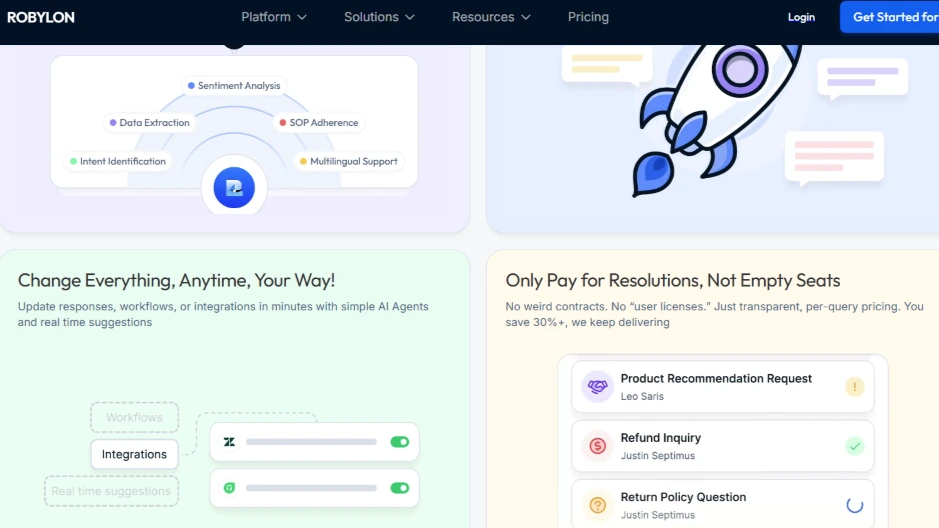
At Robylon, we specialize in autonomous AI agents built to resolve user queries, automate ticket workflows, and provide intelligent, round-the-clock assistance across chat, email, and voice. Our AI agents are designed not just to respond, but to reason, act, and improve with every interaction.
Here’s how Robylon empowers businesses to automate support at scale
- Omnichannel Automation: Our AI agents integrate natively with Freshdesk, Zendesk, Intercom, Gmail, and WhatsApp, responding across channels with consistent context retention.
- Human-like Conversations: Powered by advanced LLMs, Robylon agents understand user intent, resolve issues, and escalate intelligently when needed.
- Autonomous Ticket Handling: AI agents can read support tickets, extract key information, classify issues, and even respond or take follow-up actions all without human intervention.
- Voice AI for Contact Centers: Deploy voice agents with natural accents, real-time speech understanding, and integrations into CRMs like Zoho.
- Insights & Governance: Track AI performance, uncover knowledge gaps, and audit every action with built-in dashboards and compliance-ready logs.
Whether you are handling 500 or 50,000 tickets a day, Robylon's AI agent platform helps you reduce resolution time by 90%, automate up to 80% of support, and cut operational costs by 30%+.
Looking to scale support without scaling headcount?
Start building with Robylon today. Book Demo
Conclusion
AI agents are no longer futuristic, they are reshaping how companies operate today. Their ability to function autonomously, adapt to real-time scenarios, and work collaboratively with human teams makes them a key driver of digital transformation.
Whether you are streamlining customer support, optimizing internal workflows, or enabling real-time decision-making, AI-powered agents bring measurable gains in speed, accuracy, and scalability. As technology advances and generative AI matures, AI agents will become indispensable across industries, not just as tools but as teammates.
Businesses that understand and implement these intelligent systems early will gain a strategic edge. Now is the time to explore where AI agents can drive the most value for your organization.
FAQs
What are the main types of AI agents?
Common types of AI agents include simple reflex, model-based, goal-based, utility-based, learning agents, and multi-agent systems. Choose the type by task complexity, risk, and data availability.
How do AI agents work?
Most AI agents follow a perception → interpretation → planning → action → learning loop. They use LLMs, memory, tools/APIs, and knowledge grounding to complete multi-step workflows reliably.
What is the future of AI agents
The future lies in generative, collaborative, and emotionally aware AI agents. As enterprise adoption grows, expect to see more AI agents embedded in critical workflows.
Enterprises are adopting voice-first, agentic automation, multimodal experiences, and on-device inference for privacy and latency. Programs scale faster with stronger governance and safety.
How do AI agents learn?
Some AI agents use machine learning to improve from experience. Agents perform best with clean knowledge bases, first-party data, and tool access for orders, identity, and tickets. Add retrieval-augmented generation (RAG) to keep answers accurate and up-to-date.
Are AI agents secure and compliant?
Use consent flows, PII redaction, encryption, RBAC/SSO, and audit logs. Add approval gates for sensitive actions and run weekly transcript QA to meet GDPR, SOC 2, or PCI DSS needs.
Can AI agents replace human workers?
No, AI agents complement humans, use a human + AI hybrid model. AI handles repetitive volume and notes, while people manage exceptions, negotiation, and empathy.
What industries are using AI agents?
AI agents are being used in e-commerce, healthcare, finance, travel, SaaS, logistics, customer service, and even software development for automating tasks and scaling operations. Top use cases include AI agents in customer support, voice AI for inbound calls, lead qualification, collections, order status, and ticket automation.
How is an AI agent different from a chatbot?
Chatbots answer with predefined scripts. AI agents can plan, take actions across tools, and keep a longer-term context, which enables autonomous task completion and higher First Contact Resolution (FCR).
What exactly is an AI agent?
AI agents are autonomous software systems that perceive context, decide next actions, and execute tasks to achieve a goal. They learn from outcomes to improve performance over time and power customer support, operations, and sales use cases.





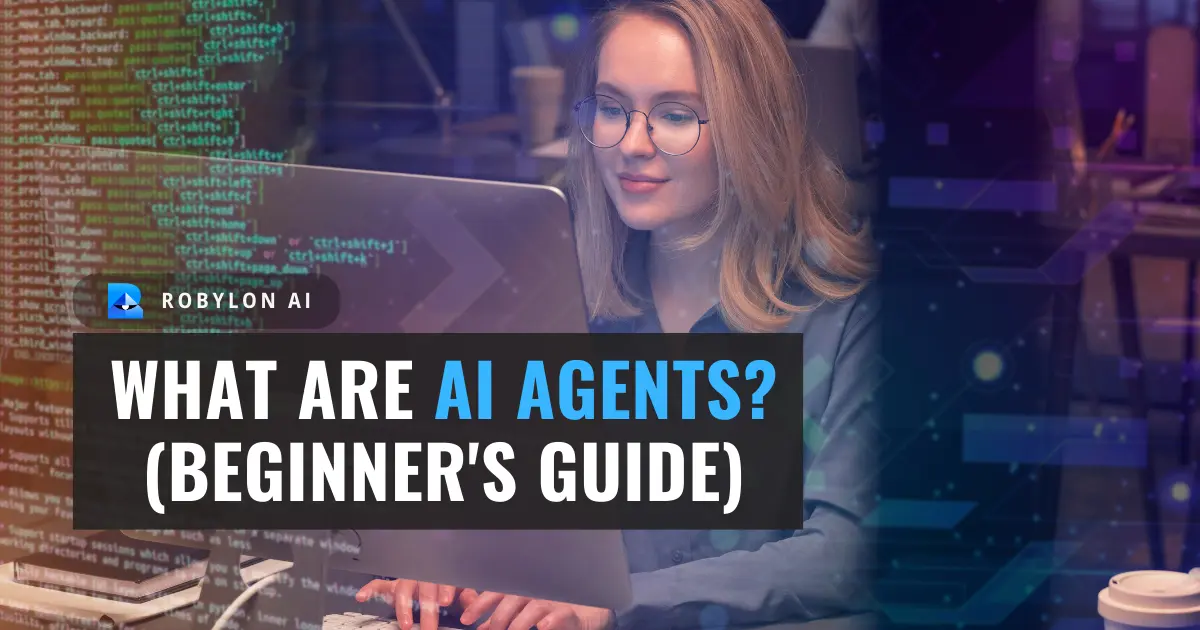
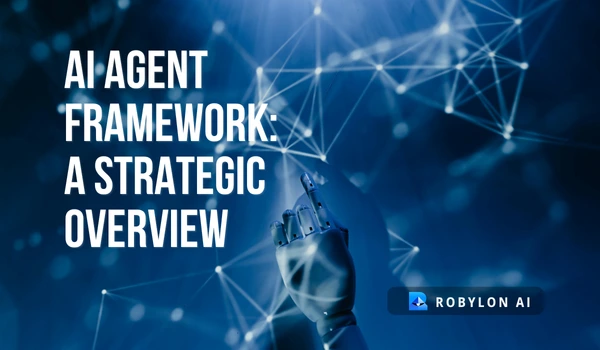
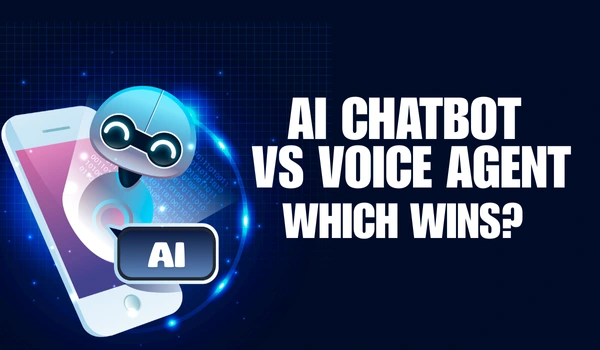
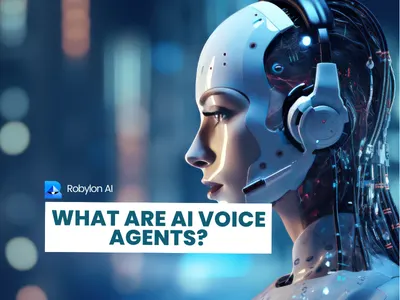
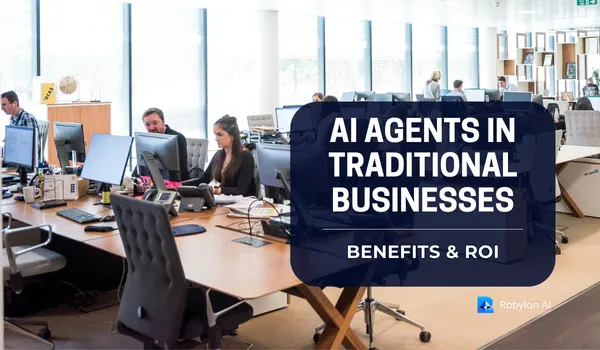
.png)
